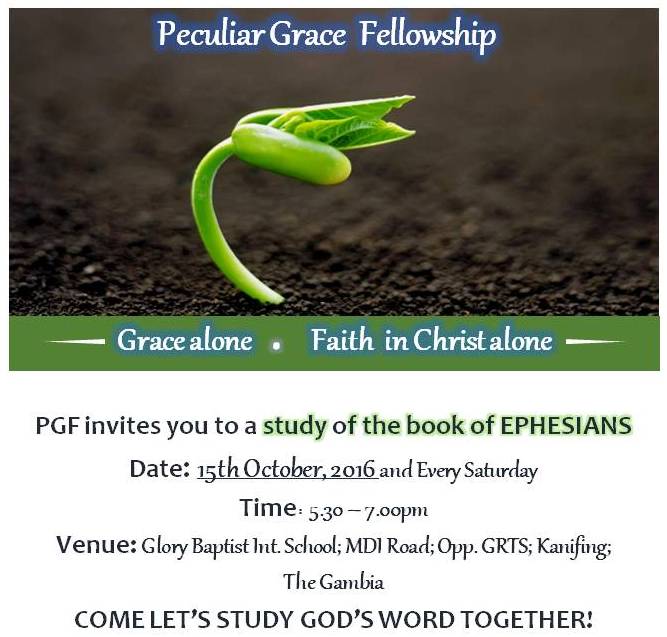
“Paul, an apostle of Christ Jesus by the will of God, To the saints who are in Ephesus, and are faithful in Christ Jesus:” (Eph 1:1).
How easy it is for us to glide over Paul’s introductory salutation to the Christians at Ephesus when we read an epistle like this! There is the temptation for us to regard this as nothing more than a format on a letterhead template which the apostle pulls up each time he is getting ready to pen down one of his apostolic letters. However, contained within this preliminary salutation and others elsewhere in the Scriptures are mighty truths of the Christian faith.
At our recent fellowship meeting at PGF we considered Paul’s words in our opening verse. We concluded that if Paul and the other New Testament writers were inspired by the Holy Spirit to write what has been carefully preserved in our Bible (2Peter 1:20-21), then it behooves us to pay attention to their words right from the beginning to end. Contained within this verse is what one can call the irreducible minimum definition of who a Christian is. In this article we will consider the very first of the three terms that Paul uses to describe these Ephesian Christians and indeed everyone who like the original recipients of this letter has come to place their faith in Christ Jesus for Salvation.
A Christian is a Saint
The first thing this verse tells us about a Christian is that he/she is a saint! Paul addressed his letter to the members of the Church at Ephesus, and he called each of them a saint, without exception. It is interesting to note that this word is used 67 times in the New Testament, and each time it was used in the plural sense. The only exception is in Philippians 4:21, where Paul said to “greet every saint in Christ Jesus”; and even here, the idea is still that of the plural sense of the word.
Contrary to the popular notion that saints are a select group of few “special” Christians who occur every now and then in every generation, the New Testament teaches that everyone who has been called to saving faith in the Lord Jesus Christ is a Saint. The word translated “saints” in the Bible means someone who has been called out or separated. Christians have been called out from the world, and separated unto God. The Church of Jesus Christ is therefore simply a community/gathering of saints – people who have been cleansed from the guilt and pollution of sin by the power of the Holy Spirit through the substitutionary work of Christ on the cross of Calvary.
Peter, in the second chapter of his epistle to the Christians in exile described a Christian in the same terms as God used to describe the nation Israel in the Old Testament – a people set apart as God’s peculiar possession and treasure (Exodus 19:6; Deuteronomy 7:6; 14:2; Isaiah 43:21). This is the exact same idea that is captured in Galatians 1:3:
“To the churches of Galatia: Grace to you and peace from God our Father and the Lord Jesus Christ, who gave himself for our sins to deliver us from the present evil age, according to the will of our God and Father, to whom be the glory forever and ever. Amen.”
How is the Christian cleansed from the guilt and pollution of sin to come into the presence of God? This is what Paul alludes to in the reference from Galatians 1 above. In using this term to describe Christians, Paul has in mind the efficacious blood of Christ, which once and for all cancelled out the power of sin in the lives of all for whom Christ died. Thus Paul goes on to tell us later on that
“In him (Christ) we have redemption through his blood, the forgiveness of our trespasses, according to the riches of his grace,” (Ephesians 1:7).
The blood of Christ alone atoned for the sins of the world and has power to cleanse the vilest offender who comes to Jesus for salvation.
Notice that Christians are not merely Saints in name only, they are called to live sanctified lives. Whilst we are Saints (sanctified) by virtue of coming to saving faith in the Lord Jesus Christ, we are at one and the same time called to be Saints (to go on living a sanctified life). This is the idea that Paul conveys in his epistle to the Corinthians:
“To the church of God that is in Corinth, to those sanctified in Christ Jesus (saints), called to be saints together with all those who in every place call upon the name of our Lord Jesus Christ, both their Lord and ours:” (1Cor. 1:2; insertion mine).
Is this true of us? Are we living lives that stand out from the world? Jesus said a city on a hill cannot be hidden. Light cannot be kept under a bushel. Are we living separate lives, or are we blending in with the world and its evil ways?
Saints, at Ephesus
The phrase “Saints at Ephesus” conveys a profound truth about the power of the Gospel. The city of Ephesus, as we read in Acts 19, was a notorious pagan city which boasted the image of the goddess Diana which they purported to have fallen down from heaven. At the time Paul wrote this epistle, the practice of sorceries and witchcraft was commonplace in the city of Ephesus. On the idolatrous nature of this city, Charles Hodge¹ writes,
With the worship of Diana the practice of sorcery was from the earliest times connected. The “Ephesian letters,” mystical monograms, used as charms or amulets, are spoken of frequently by heathen writers. Ephesus was, therefore, the chief seat of necromancy, exorcism, and all forms of magic arts for all Asia.
Paul on his missionary visit to Ephesus initially found only 12 disciples; however, as he continued to preach for the space of 2 years, we read that “all the Jews and Greeks in the province of Asia heard the word of the Lord” (Acts 19:10). Luke further records the results of consistent faithful Gospel preaching – people who practiced sorceries came and confessed and brought their books and burned them, and so the word of the Lord spread widely and grew in power (Acts 19:19)!
The Gospel is the power of God unto salvation for everyone that believes (Romans 1:16) and everyone needs to hear its good news. As we faithfully declare it, the power of the Lord will transform even the most written-off lives and bring about salvation! If the Gospel was able to produce Christians even at Ephesus, the seat of paganism, similarly it is able to produce Christians in every land where it is faithfully proclaimed!
Rightly did Fanny Crosby note,
O perfect redemption, the purchase of blood,
To every believer, the promise of God;
The vilest offender who truly believes,
That moment from Jesus a pardon receives.~Fanny J. Crosby (1820-1915).
Bibliography
- A Commentary on the Epistle to the Ephesians; Charles Hodge. New York: Robert Carter and Bros. [1860]


